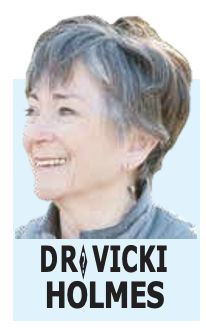
Macular degeneration is the leading cause of blindness, affecting 2.5 million Canadians; 180,000 with significant vision loss.
There are two basic types of age-related macular degeneration (AMD) — dry and wet.
Dry AMD affects 80-90 percent of those with AMD. Drusen is a protein that gets deposited in the macula, impairing the nutrient transport to the retina in that area.
The macula is responsible for central and acute vision. These light-sensing cells send messages to the brain through the optic nerve. Although this is the most common type, it is only responsible for 10-15 percent of the cases of blindness.
While there is no good treatment for this, taking nutrients and vitamins— Vitamin C, E, zinc, copper, lutein and zeaxanthin (carotenoids) — called AREDS2 formula and an anti-inflammatory diet may help to delay progress.
An excellent book on this diet is Eat Right for Your Sight, Jennifer Trainer Thompson and Johanna M. Seddon from the American Macular Degeneration Foundation. A late form of this type is geographical atrophy and an exciting new therapy has been approved by the FDA in February of this year.
Wet AMD makes up 10 percent of these cases, but leads to 80-90 percent of blindness. New blood vessels form in the area beneath the retina, causing swelling, bleeding, leaking of fluid, and scarring causing rapid vision changes. This can lead to central blindness, distortion and haziness of vision.
Risk factors for developing AMD are smoking, family history, cardiovascular risk factors, being Caucasian and prolonged exposure to UV light.
TREATMENTS
- Eye injection – It has been found that those with AMD have higher levels of vascular endothelial growth factor — a substance that encourages new blood vessel formation. I remember in 2005 when we were thrilled with the development of a drug with anti-VEGF properties. We were then able to treat people with wet AMD with an eye injection every 4-6 weeks to help prevent the proliferation of blood vessels. It has been very effective and now a new drug has come on the market that allows for treatments every three months.
- Photodynamic therapy – The use of laser photocoagulation therapy has had problems because it can damage the area of the retina that is being treated. A new drug, verteporfin, is injected into a vein in your arm, then using a non-thermal red photodynamic light, the drug is activated to close off the vessels. This causes much fewer side effects.
- Gene therapy – This uses your own body to create anti-VEGF immunity. By inserting a VEGF-carrying virus into the clients DNA, our own immunity is stimulated to control VEGF. Another drug blocks the complement cascade, an immune response that is harmful to the retina. One of these drugs, pegcetacoplan, is useful in geographic dry AMD — a truly remarkable new development!
- Port Delivery System – one of the drawbacks to our current system is the need for repeated injections. This port system is implanted in the eye and is released slowly — may last up to two years.
- Anti-VEGF eye drops – still in development.
- Oral anti-VEGF will be a while in the making. We have VEGF receptors all over our bodies — blocking this in other areas leads to too many side effects.
- Combination with glaucoma product holds promise.
- Radiation – destroys rapidly growing cells and may play a role.
- Stem cell transplant – Retinal segment epithelial cells can be harvested from the clients own body, suspended in fluid and injected under the retina to support the photoactive cells or applied to a matrix and implanted. While active research is going on, it likely won’t be available until 2030.
- Old drugs have been found to reduce the risk of developing AMD — Prozac, and anti-depressant, and metformin, a drug used to treat diabetes.
- New lenses allow magnification of the vision and projection to healthier cells in the macula.

This news is important to give those who continue to faithfully go and get injections frequently. There is active research into better forms of treatment. It sounds simple to inject an eye, but it can be very unpleasant.
Most of these are in phase two or three research and not readily available, but will be in the next few years.
Dr. Vicki Holmes is a Saskatoon retired family physician who has a special interest in Palliative Care and Women’s Health. She is passionate about sharing medical information with the public!
(Vicki’s Photo: Memories by Mandy)
- Dr Vicki Holmes

Leave a Reply